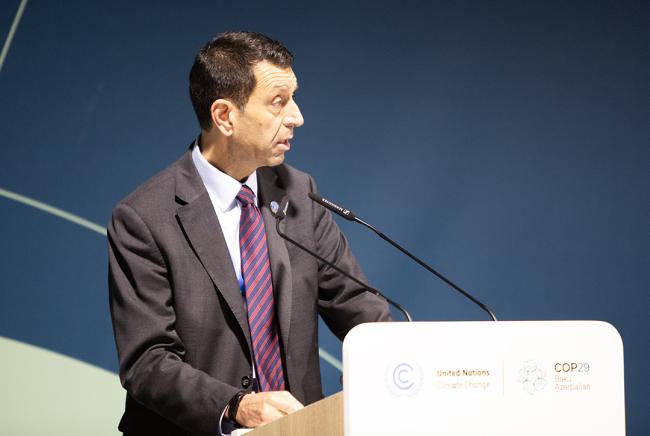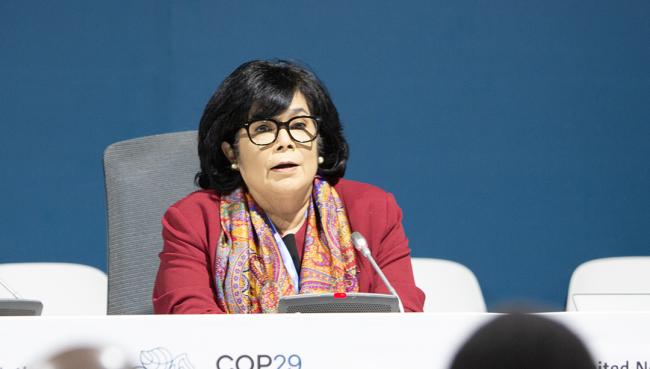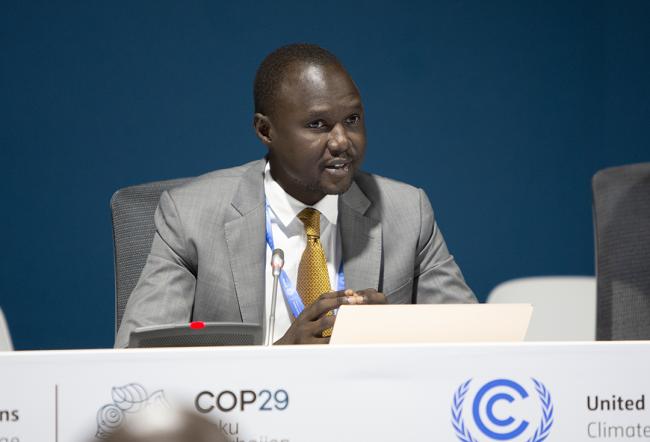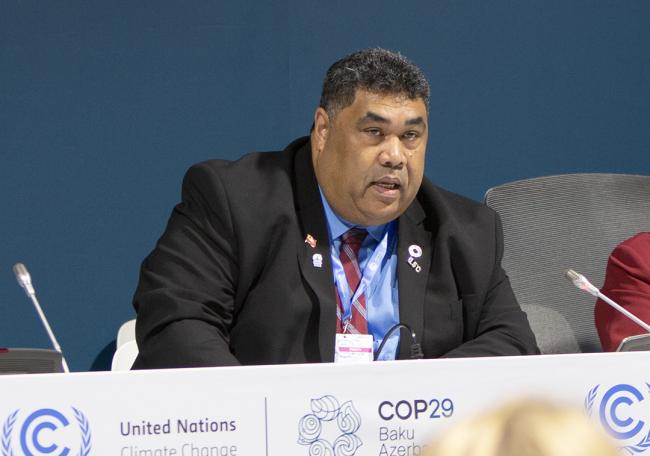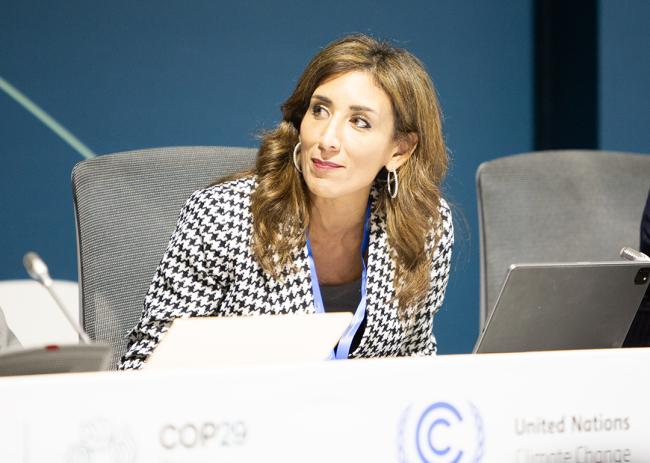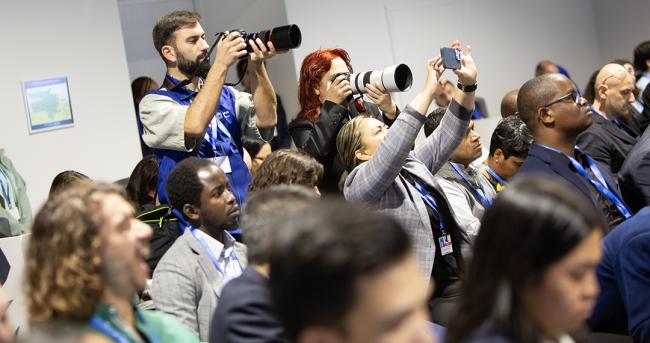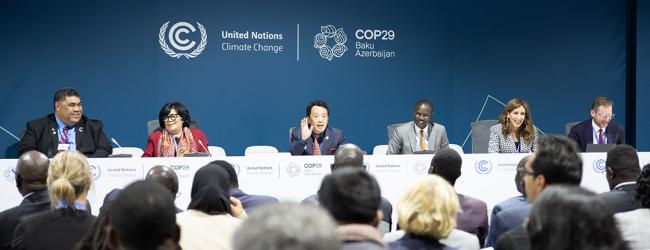About
Assessing the need for fundamental changes in agrifood systems, Food and Agriculture Organization (FAO), along with government, and World Bank leaders stressed the mere 4.3% of total mitigation and adaptation finance going to the sector along with the potential of finance to deliver improvements in food and agriculture practices and security.
Climate finance for agrifood systems must be a central component of government responses to climate change if the goals of the Paris Agreement, resilient food systems, and emission reductions from agriculture and food are to be achieved. At this event, the Food and Agriculture Organization of the UN (FAO), along with government and World Bank leaders, underscored the insufficiency of current financing and investment for agrifood systems transformation, which accounts for only 4.3% of total mitigation and adaptation finance.
Kaveh Zahedi, Director of the Office of Climate Change, Biodiversity and Environment, FAO, moderated the event. He introduced the panel by noting that food and agricultural systems must fit into COP 29 conversations about a New Collective Quantified Goal on Climate Finance. “There is no climate solution without agrifood systems solutions,” Zahedi said. This requires scaling up “fundamental system change” to address gaps and needs to keep climate change within the Paris Agreement’s 1.5°C temperature target.
Opening the panel discussion, FAO Director-General QU Dongyu told a popular story for children in China of strong and brave fish that, despite swimming against the current, make the final leap over a waterfall to transform into powerful dragons. “We tell this story to our children to encourage them to work hard,” Dongyu said, noting that the world similarly faces the opportunity to achieve climate goals “if we are bold enough.”
Director-General QU Dongyu emphasized that a third of the world’s greenhouse gas emissions come from food systems. He underscored the finance gap for transformational changes in food systems, stressing funding must be “just and sustainable,” which requires de-risking investments to make them more attractive. He added that FAO and the Green Climate Fund (GCF) are “swimming fast against the current,” with 23 high impact programmes valued in total at USD1.4 billion and new efforts to leverage co-financing and share skills and expertise. “Let us be like the brave fish in the river making the brave leap into the transformation. A coordinated, ambitious push from us can unlock finance,” he concluded.
In a first round of interventions, Zahedi asked panelists to discuss key finance gaps, especially for agrifood systems.
Maria Antonia Yulo-Loyzaga, Secretary of the Department of Environment and Natural Resources, the Philippines, emphasized her country is suffering from both rapid and slow onset events that are having major impacts on the agriculture sector. She pointed to the need to link climate change, biodiversity, the Sustainable Development Goals (SDGs), and disaster reduction goals. Noting that social and physical geographies intersect, she stressed that the need for social transformation is important to address along with changes in production, logistics, and infrastructure.
Pal Mai Deng, Minister of Water Resources and Irrigation, South Sudan, noted that people in rural areas are impacted by lack of services and access to markets, but there has been only limited investment in agriculture. Deng highlighted that only 4% of South Sudan’s arable land is cultivated and that finance is needed to implement policies to develop agriculture and irrigation. He said the government is devoting 10% of its annual budget to food security.
Tiofilusi Tiueti, Minister of Finance, Tonga, said his country is on the frontlines of climate change and is cooperating with FAO and other agencies to transform its agricultural systems, through, for example, actions to modernize agriculture and enhance food security. He noted that while farmers get subsidies to support them in disasters, there is a need to transform recovery stages into more sustainable stages, which is an ongoing challenge for finance.
Shaimaa Al-Sheiby, Vice President for Public Sector and Strategy, OPEC Fund for International Development (OPEC Fund), noted the relatively small proportion of global climate finance going to agrifood systems and stressed the need to balance investments in adaptation and mitigation. She also emphasized regional gaps in finance, such as in South Asia, and the challenge posed by data limitations.
Martien Van Nieuwkoop, Director for Agriculture Development, Gates Foundation, stressed that the acceleration of climate change has put agrifood systems in “uncharted territory,” with temperatures now higher than they were when humans began agricultural practices 10,000 years ago. He explained that addressing this requires innovation at the same scale as innovation in other sectors, such as energy. He also pointed out, inter alia, that: agrifood investments must be tailored to local contexts; investments must be de-risked; and improvements are needed in measuring the co-benefits of climate finance.
Renaud Seligmann, Director for Strategy and Operations, Planet Vice Presidency, World Bank, underscored that the money exists for transformative change in agrifood systems, and that subsidies must be accompanied by improvements in water management and the use of fertilizers. Climate-smart agriculture, he said, can deliver triple wins in reducing pollution, improving food security, and enhancing resilience. He also noted that digital solutions and de-risking can help finance reach agricultural communities directly and connect them with industry to transform value chains.
The second round of interventions focused on examples of successes on the ground in enhancing agrifood systems. Yulo-Loyzaga noted cooperative efforts in villages where farmers, using the best information and analytics, organize to act together on finance. Al-Sheiby pointed to communal practices in Burundi where just USD 20 million in investment helped reclaim land for agriculture, expanded access to markets, and improved infrastructure. Deng underscored South Sudan’s priorities of investing in food security, with funding from public and private sources going to support small-holder farmers. Tiueti pointed to a public-private partnership to build the infrastructure to connect farmers to markets.
Seligmann gave the example of a village in Nepal where World Bank investments helped low-caste women improve their vegetable farming productivity, which enabled them to buy bicycles and eventually food delivery trucks, as well as provide money for their children to go to school. Seligmann said this bottom-up transformation must be connected with big businesses looking for climate-smart producers. “If we are able to have a full value chain that is connected by financing, then you get to something transformational at scale,” Seligmann emphasized.
Van Nieuwkoop emphasized the need to accelerate “blue-sky opportunities, such as improved rice strains, and creating a digital soil map for Africa. Artificial intelligence, he added, is also used in applications that improve the efficiency of fertilizer use and lower the cost of production.
In the Q&A session, audience members asked about issues of digital accessibility and declines in pastoralism compounded by climate change and fragility. In answering questions, Van Nieuwkoop suggested that companies and donors can partner to extend digital services, and Seligmann stressed the need for better coordination to unlock financing hoops.
Closing the event, Al-Sheiby, Deng, Yulo-Loyzaga, and Tiueti focused their remarks, respectively, on cooperative approaches, delivering on commitments, ecosystem-based approaches to achieving co-benefits, and the need for harnessing local knowledge.
In his closing remarks, FAO Director-General QU Dongyu emphasized “we have to change the way of doing business” across the whole agricultural and food value chain.
Organizers: FAO, the UN Development Programme, The World Bank, and the Better than Cash Alliance
Contact: Julia Wolf I Julia.Wolf@fao.org
Website: https://www.fao.org/
To receive free coverage of global environmental events delivered to your inbox, subscribe to the ENB Update newsletter.
All ENB photos are free to use with attribution. For 2024 UN Climate Change Conference Baku - Side Events , please use: Photo by IISD/ENB | Angeles Estrada Vigil


